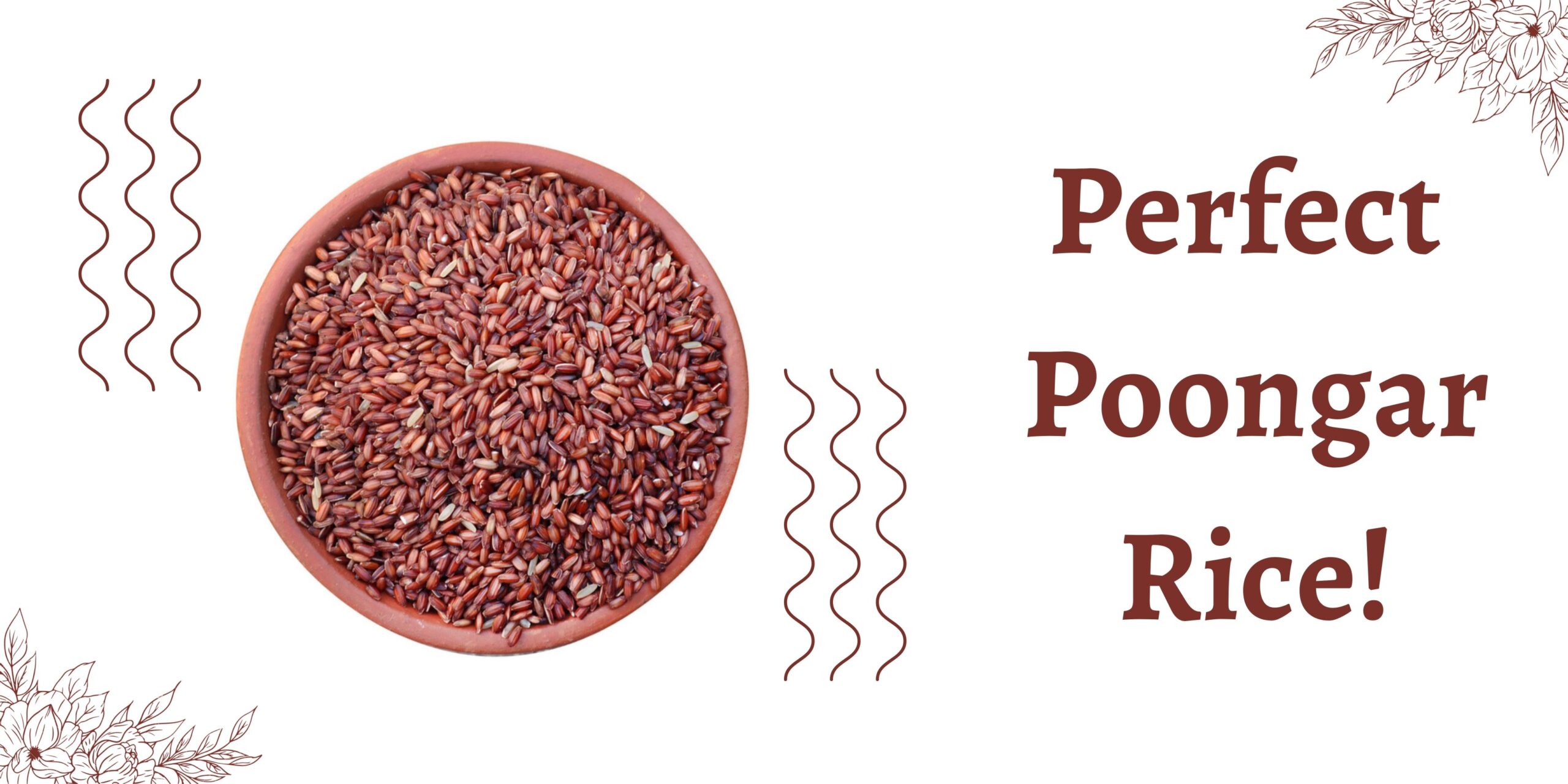
Perfect Poongar Rice!
The benefits of Poongar rice are fully elucidated in this post. Poongar rice, also known as “Poongar arisi,” is a traditional rice variety developed in Tamil Nadu employing organic farming methods. It consumes less water and is resistant to flooding. It has a brownish colour and is similar to Mappillai Samba Rice. It is hand-pounded and has more minerals than other types of rice. It is also known as “women’s rice” because it treats most women’s hormonal disorders. It is especially beneficial to expecting moms and nursing mothers.
Some parts of Tamil Nadu grow traditional red unpolished rice known as “Poongar.” However, unpolished and semi-polished variants with husk and bran layers eliminated during the milling process are also available.
This rice is high in anthocyanins, an antioxidant. Anthocyanin is responsible for its nutty flavour and reddish-brown colour. Poongar rice also contains minerals such as molybdenum, zinc, iron, and magnesium. Its husk is very delicious and nutritious.
Advantages of Poongar rice
Poongar rice aids in the recovery of celiac disease patients, decreases cholesterol, increases blood haemoglobin levels, treats diabetes, and boosts the immune system. When ingested regularly, Poongar rice assists pregnant women in having a normal pregnancy.
An unusually high quantity of cholesterol in the body may restrict blood circulation, eventually leading to a heart attack. Poongar consumption can help lower the overall level of cholesterol in the body. It aids digestion since it includes a high level of fibre. Poongar lowers the risk of heart disease, improves obesity-related illnesses, and stimulates hunger.
Removing bad sweat from the body is one of the benefits of Poongar rice. It is rich in the antioxidant known as anthocyanin, which helps the body get rid of toxins released via sweat and promotes a healthy lifestyle.
This rice is known to be high in micronutrients, including vitamin B12 and iron, which is why our forefathers may have recognised its health benefits, particularly for women. Women consume Poongar rice after puberty to prevent difficulties with the reproductive system.
More advantages of Poongar rice
Poongar rice is also beneficial for headaches, and some people believe that it can improve memory. It has vitamin B1, which is highly beneficial in the treatment of mouth and stomach ulcers, as well as other stomach-related issues.
Boosting the immune system is included in the benefits of Poongar rice. It strengthens the immune system by increasing the concentration of haemoglobin in the blood. It provides strength to the body and inhibits or controls paralysis. It contains a high concentration of micronutrients. Thus, consuming it provides the body with all the vital nutrients required to function properly.
Poongar rice contains a significant amount of iron, which helps to sustain and maintain a proper haemoglobin level. Children and adults with low haemoglobin levels can consume this Poongar rice. These rice varieties have bright red colour and a delicious flavour.
A deficiency in fibre and water can lead to constipation. Poongar rice is high in fibre, which aids in constipation relief. Regular use also helps to alleviate gas and bloating. Patients with irritable bowel syndrome (IBS) can consume this rice because it is gluten-free.
Uses of Poongar rice
Poongar rice is widely prescribed for pregnant women and nursing mothers since it helps the body keep its strength. It will most likely be delivered to them in the form of Kanji. When pregnant women consume Poongar Rice on a regular basis, the ensuing child will be strong and healthy when they are born.
Regulating diabetes is one of the benefits of Poongar rice. Poongar rice, as compared to other rice types, reduces the blending of glucose in the bloodstream. Diabetic people would benefit the most from it.
Poongar rice is noted for its great tolerance to both drought and flooding, allowing farmers to produce this crop all year. Furthermore, it is not sensitive to disease. The high peroxidase concentration in rice probably is to account for these properties. So include poongar rice in your diet to reap its many benefits.
For this rice to become soft, it must be soaked for at least four to six hours. Therefore, it is more suited to be used in breakfast delicacies like dosai, idli, Kanji, or idiyappam rather than being eaten as rice alone.